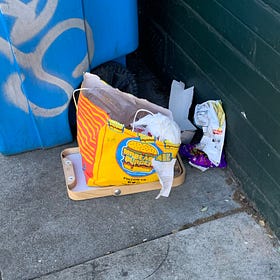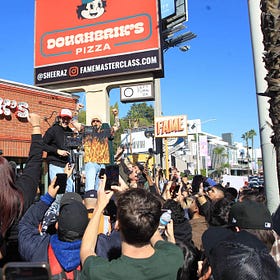Virtual superstar MrBeast meets restaurant reality
You have to master the food *and* the algorithm

In a series of now-deleted tweets over the weekend, Jimmy Donaldson, aka MrBeast, said that he’s stepping away from his virtual restaurant brand, MrBeast Burger.
By many accounts, the brand was a huge hit. It launched in December 2020 with 300 locations, and in the years since has grown to include about 2,000. Donaldson has an online audience of millions, with 161 million YouTube subscribers clearly ready to support his endeavors. Just last week on a podcast tied to a piece he wrote for the New York Times Magazine, journalist Max Read described MrBeast Burger as “one of his most successful endeavors right now.”
The praise is ill-timed, but Read’s coverage makes Donaldson’s interest in growing his reach, his brand, and his influence very clear.
On the podcast, Read offered his take on why a powerful online figure might be interested in an online restaurant empire: Consider that Donaldson spent years obsessing over YouTube success, tweaking videos and thumbnails to master the platform and rise to the top. Perhaps, Read said, Donaldson’s motivation is a desire to master the algorithm on apps like DoorDash in the same way. It’s just another online marketplace, right?
Except, as we’ve learned, salad doesn’t scale like software. Or in this case, Beast Burgers don’t scale like viral videos — even with the best of intentions.
Donaldson cites food quality issues in the deleted tweets announcing his attention to bail on the brand.
“I started MrBeast Burger to help restaurants make more $ during the pandemic, and it worked!” he wrote. “But sadly when working with 2,000 restaurants I don’t own it’s impossible to guarantee the order quality.”
In a subsequent tweet, he added that he wanted to retire the brand, “but the company I partnered with won’t let me stop… Young beast signed a bad deal.”
MrBeast Burger is operated in partnership with Virtual Dining Concepts.
VDC was founded by Robert Earl, the entrepreneur behind Planet Hollywood and a slew of other hugely successful restaurant brands. MrBeast Burger is clearly the company’s star, but VDC also works with influential brands and celebs like the Real Housewives, Barstool Sports, and Mariah Carey.
It was an interesting, if effective partnership for Donaldson. As MrBeast, he’s known for his large and stunt-y, but also philanthropic YouTube videos. He’s given away money, cars, islands — he’s even paid for surgeries to reverse people’s blindness. And people love him for it! His fans are rabidly loyal, protective, and defensive of his work.
“…what makes Donaldson stand out is not that his videos make you feel ‘icky’ (as another streamer put it), but that he puts that ickiness to work,” Read wrote in the Times Magazine.
It’s been a particularly bad couple of weeks for the virtual brand business.
Last week, Nextbite, a well-funded virtual brand venture previously partnered with celebs like Wiz Khalifa and brands like Nestle, sold itself to Sam Nazarian, owner of a collection of nightclubs, restaurants, hotels, and virtual restaurant concepts.
In conversations I had with Alex Canter, Nextbite’s co-founder and CEO, he often explained the company’s value in terms of underused restaurant kitchens. If a restaurant wasn’t using all of its available kitchen space and capacity during every open hour, it wasn’t operating as efficiently as possible. Adopting a couple big-name virtual brands backed by a large company could make a restaurant cash, he said.
Canter even brought on restaurant industry veteran Denny Post, who, in a January interview with Expedite, seemed genuinely intrigued by the potential of virtual restaurant brands in a physical world. (Post left the company amid layoffs shortly before it was sold.)
Donaldson seemed to think his virtual restaurant would work similarly. It seems he believed his brand would help restaurants in the same spirit of philanthropy he’s internet famous for offering; it was launched during those bleak early winter pandemic days when we all needed an emotional lift, at a time when plenty of restaurant owners needed a financial one, too.
Those days, it appears, are over.
In the past, Donaldson showed signs of wanting to grow the brand, not distance himself from it.
Last September, Donaldson and the team behind MrBeast Burger launched an IRL restaurant at a giant mall in Northern New Jersey, just outside New York City. The opening was, by any measure, an extraordinary success. It drew a crowd of thousands, including over two thousand people who camped out the night before to be part of the opening. Donaldson claimed he broke the world record for most burgers sold in one day by a single restaurant (5,500) and even hinted he’d be open to more physical locations.
“Should we… franchise?” he asked his online followers.
That real-world success, praise, and fan turnout seems more up MrBeat’s alley than the slew of negative reviews he’s clearly received for the food. And he’s right, it is impossible to control food quality at 2,000 disparate locations around the world spun up quickly to capitalize on intense internet fame.
On Monday, a Virtual Dining Concepts exec declined to comment on Donaldson’s tweets or the future of the brand. As of now, the MrBeast Burger website, app, and third-party app listings appear to be operating as usual.
One eagle-eyed Twitter fan noticed that a video announcing the initial restaurant in 2020 was deleted last month. In a Twitter reply that’s not yet been deleted, Donaldson again lamented his lack of control over the food served by his burger chain. Instead, he wrote, his plan is to focus on Feastables, his line of packaged snacks. Their quality, presumably, is easier to control, just like his mastery of YouTube’s algorithm — not at all like the volatility involved in producing restaurant-quality food for delivery.
In addition to that so-called “bad deal,” it seems Young Beast focused on the wrong food business. “Making snacks is awesome and something I’m way more passionate about,” he wrote.
Related Expedite coverage:
Salad doesn't scale like software
Sweetgreen debuted on the public market in mid-November to investor fanfare. Its stock price popped on day one, opening at $52 per share up from an initial price of $28. At that price, the company wa…
Trouble in celebrity brand-land
San Francisco Chronicle restaurant critic Soleil Ho absolutely does not recommend any of the celeb-backed virtual brands they tried for a recent …
"Certified Virtual Restaurants"
Fine, I will admit it: MrBeast Burger is not a fad. The virtual burger chain started by a YouTuber who has amassed 130 million followers by being a literal nice guy in his videos is 2 ½ years old and entrenched in the restaurant industry. It’s become a standard for what a successful brand activation can achieve. And it just got another big stamp of approval.
Internet culture seeps into restaurants
Hi! This post has gotten some good attention, so I’m dropping the paywall. For more coverage on the future of restaurants:





